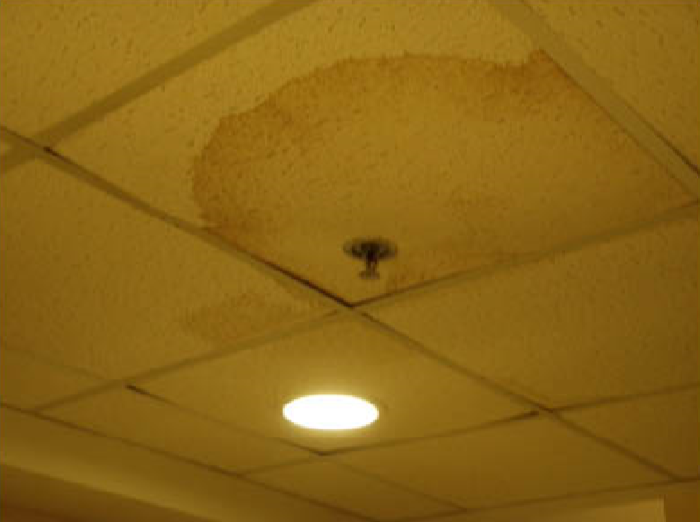Concordia University bought three floors of the building for $9.5 million
Cracking bricks, building-wide leaks and ceilings that weren’t up to code—these are just some of the issues inspectors raised to Concordia after visiting the Faubourg Ste-Catherine, years before the university purchased three of the building’s floors for $9.5 million.

The inspection report, obtained by The Concordian through an Access to Information Request, was presented to Concordia after being commissioned by the university in December 2010. The document details the condition of the Faubourg after Concordia University had already established classrooms in the basement level.
According to the report, the outer walls of the structure exhibited discolouration, which indicated “a faulty assemblage, leakage, infiltration and/or other potential problems.” In addition, some bricks were seen “to have become loose and/or got chipped,” and cracks were noted in some of the exterior wall bricks. The documents added that the causes needed “to be investigated and treated and should not be overlooked nor neglected.”
The document also delved into the second basement floor, which is currently used as classroom space for the university. Inspectors noted that that level—which was already occupied by Concordia at the time—was in need of certain repairs.
Areas of the ceiling needed “to be replaced and corrected … because of damages possibly because of [a] leakage” that permeated several floors of the building. Inspectors also found a wall with “a vertical crack on the north side of the building,” as well as a particularly damaged wall elsewhere on the floor. The benches in the common area were singled out for replacement, due to the chipping of the marble and the poor condition of the leather on the banquettes.
There were also notable problems with staircases in the lower floors. The report claimed that several stairs needed to be refinished, including the stairs connecting the first and second basement floors, in addition to the curved staircases leading to the lower classrooms.
The inspectors also assessed floors five and six of the Faubourg, which were purchased two years later by Concordia for $4.5 million. The report noted areas such as handrails and the ceiling height were not code compliant, “and would need to be adjusted and/or replaced.” The report also noted a circular staircase between the fifth and sixth floors that was apparently blocked off and “[seemed] to be dangerous.”
Ultimately the report assessed the fifth and sixth floors as being in good condition. However, it also claimed that areas of the walls, ceilings and floors “need to be added or replaced as they are missing, broken, or damaged,” and that some places “need to be treated and repainted as they have been affected by leaks and/or water.”
Accessibility was also raised as an issue, with no way to reach the sixth floor without taking the stairs.
The escalators and elevators in the space were also assessed. The due diligence report for the escalators claimed that two of them were not compliant with safety codes, lacking a “large number of safety devices [which] are not installed on those units.” The escalators were also not well-maintained, as the report found “that a lack of preventative maintenance is leading to premature deterioration of some components.” It estimated that the cost for modernizing the escalators in question would be over $120,000 over two to five years.
The elevators were found to be acceptably maintained, however, the life expectancy for all of them was found to be five years or less from the time of writing in 2010. One elevator would require over $135,000 to repair; another two would require an estimated $160,000 combined.
Marie-Christine Houle, a Media Relations Coordinator with Concordia University, confirmed that renovations were done to the fifth and sixth floors, in addition to the ground floor lobby exiting onto Ste. Catherine St. No renovations were done to the basement space.
The total budget for the Faubourg project was approximately $10.5 million, according to Cléa Desjardins, Senior Advisor for External Communications at Concordia University. Following the purchases for the space, that left approximately $1 million for renovations.
“The renovations [made] are largely functional and include architectural and mechanical upgrades,” said Desjardins. “The Faubourg’s central location and the fact that it could meet our academic needs made it a solid option.”
The report also wrote that “the purchase of phase four [floors five and six] precedes the purchase of phase one [ground to fourth floors].” Concordia representatives could not confirm by press time whether or not the university had ever considered purchasing the entirety of the Faubourg building.